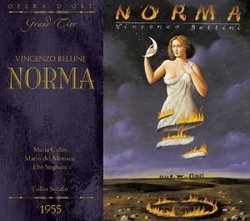| All Artists: Vincenzo Bellini, Tullio Serafin, Milan Radio Symphony Orchestra, Milan RAI Symphony Orchestra, Athos Cesarini, Ebe Stignani, Giuseppe Modesti, Maria Callas, Mario del Monaco, Rina Cavallari Title: Bellini: Norma Members Wishing: 0 Total Copies: 0 Label: Opera D'oro Original Release Date: 1/1/2000 Re-Release Date: 11/4/2003 Genre: Classical Styles: Opera & Classical Vocal, Historical Periods, Modern, 20th, & 21st Century Number of Discs: 2 SwapaCD Credits: 2 UPC: 723724518520 |
Search - Vincenzo Bellini, Tullio Serafin, Milan Radio Symphony Orchestra :: Bellini: Norma
 | Vincenzo Bellini, Tullio Serafin, Milan Radio Symphony Orchestra Bellini: Norma Genre: Classical
|
Larger Image |
CD Details |
CD ReviewsLegendary Norma Emma de Soleil | On a holiday In Ibiza, then back to the UK for stu | 05/18/2004 (5 out of 5 stars) "If I were asked to list my top three Normas (Norma being my favourite opera) this would rank third after the La Scala Norma 1955 (Callas, del Monaco, Simionato) and Callas' Covent Garden debut as Norma in 1952. (Made available by EMI) This Norma, which was done in concert, marks Callas' most supreme heights and combination of vocal splendour with mature interpretation. This is a more dramatic Norma than the feminine, touching Norma at La Scala a few months later. Nevertheless, she sings beautifully and brilliantly. Especially the coloratura of Norma's "Casta Diva" is of amazing brilliance and splendour. Another highlight would be her "Dormono entrambe", a moment she like no other Norma illuminated, filled with motherly affection and love as well with haunting drama. The final scene is just sublime, to know why she is the best Norma forever just listen to her extraordinarly beautiful "Qual cor tradisti, qual cor perdesti". Del Monaco is in top form as Pollione, much better than for example second rate Alexander. Ebe Stignani, then at the very end of her fabulous career as a dramatic mezzo (She was the greatest Eboli and a fantastic Laura, Azucena and Amneris) sings Adalgisa beautifully, even though she sounds a little mature, especially when compared to Callas' silvery sound. Serafin conducts with the mastery we know and love, the sound-quality is absolutely amazing. A Norma well worth buying!" Callas scores and soars in this legendary Norma! D. J. Edwards | Cheshire, CT United States | 10/10/2005 (5 out of 5 stars) "For a legendary recording I am amazed that there is only one review of this recording. Where are all the Callas lovers who are forever bashing other singers who have recorded roles that they shared with the Callas canon? This is worthy of every accolade that has been lavished on this performance since it was first released. Certainly an electrifying evening in the theater! For a 1955 performance the sound is very good. Fortunately Opera d'Oro has recorded the performance with much more success than some other labels who have attempted to re-release this on Cd. This comment is based on a review in Fanfare of this performance on previous recordings where there was a very serious problem with pitch. No such problem here: Callas is without peer in interpretation and drama. Her notes are full, rich and beautiful in tone but it is easy to see that performances like this Norma, her legendary Tosca on EMI and the Karajan-Berlin Lucia greatly shortened her vocal life. But we are the winners. Del Monaco is excellent if not too subtle, but such glorious sound. Stignani is a little inconsistent but certainly exciting and often enough rich in tone. Modesti is not a name I am familiar with. He sings his role well but careers are hardly made on this role. Serafin again confirms his legendary status as a great conductor who was always demanding but also professionally considerate of those he worked with. According to what one reads he played a very important role in Callas' career. This should be on your shelf and in your CD player." Poignant Norma Raymond M. Bercse | 06/14/2007 (5 out of 5 stars) "This concert version of Norma for the Italian Radio fell on the heels of Maria Callas's busiest season at La Scala, 1954-55. She sings with great abandon, and her voice is fresh and vibrant. The interpretation is phenomenol. This is her last documented recording where we hear the true darkness and fullness of her tones. Some of her chest tones are similar in sound to her 1952 recording of La Gioconda. She is using the lower larynx position which gives her voice a dark sound. Dropping the jaw and keeping the mouth in an oval position from the low notes to the high ones will reflect a rich and full tone. Although she continued to employ chest tones for the remainder of her career, the voice itself was not as opulent. Many opera buffs thought it was due to her weight loss. They claim that Callas's voice was fat during her early years, and after the weight loss the voice was less full. In this performance her lower and middle range have the same richness and fullness as in 1952 and '53. She altered her method of technique by placing her voice in a higher position and lightening it especially for Lucia and Amina. See my review of Callas's Lyric-Coloratura Aria's. I will always maintain that Callas's voice would have lasted longer if she stayed in the heavier dramatic roles.
Mario Del Monaco as Pollione has clarion power and depth. Ebe Stignani as Adalgisa sings with great passion even though the voice is no longer pristine. Giuseppe Modesti as Oroveso has an authoritative and ominous tone. Tullio Serafin at the helm realizes the true style of Bel Canto. This version of Norma belongs in your collection." |

 Track Listings (10) - Disc #1
Track Listings (10) - Disc #1